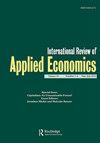Multiplier effects of social protection: a SVAR approach for Brazil
IF 1.6
Q3 ECONOMICS
引用次数: 2
Abstract
ABSTRACT Based on a Structural VAR approach, we estimated fiscal multipliers for social benefits in Brazil for 1997–2018. Our results suggest that social benefits have relatively large multiplier effects, even when compared to public investment. The multipliers are also larger in the full sample, which includes the country’s 2014–16 economic crisis than in the period 1997–2014. In particular, our results show that spending one unit on social expenditures generates a final change in GDP of almost three after two years. The higher estimated multipliers in the full sample appear in the response of household consumption and private investment to shocks in total social expenditures and for different types of social benefits (e.g. cash transfers, unemployment insurance, and pensions). In a context in which the expansion of social protection became prominent as a response to structural changes in the labor market and the Covid-19 pandemic, our paper reinforces its potential role in the short-run economic recovery.社会保护的乘数效应:巴西的SVAR方法
摘要基于结构性VAR方法,我们估计了1997-2018年巴西社会福利的财政乘数。我们的研究结果表明,即使与公共投资相比,社会福利也具有相对较大的乘数效应。在包括该国2014-2016年经济危机在内的整个样本中,乘数也比1997-2004年期间更大。特别是,我们的研究结果表明,在社会支出上花费一个单位,两年后GDP的最终变化几乎为三。全样本中较高的估计乘数出现在家庭消费和私人投资对社会总支出和不同类型社会福利(如现金转移、失业保险和养老金)冲击的反应中。在扩大社会保护作为对劳动力市场结构变化和新冠肺炎疫情的回应而变得突出的背景下,我们的论文加强了其在短期经济复苏中的潜在作用。
本文章由计算机程序翻译,如有差异,请以英文原文为准。
求助全文
约1分钟内获得全文
求助全文
来源期刊

International Review of Applied Economics
ECONOMICS-
CiteScore
4.30
自引率
4.50%
发文量
37
期刊介绍:
International Review of Applied Economics is devoted to the practical applications of economic ideas. Applied economics is widely interpreted to embrace empirical work and the application of economics to the evaluation and development of economic policies. The interaction between empirical work and economic policy is an important feature of the journal. The Journal is peer reviewed and international in scope. Articles that draw lessons from the experience of one country for the benefit of others, or that seek to make cross-country comparisons are particularly welcomed. Contributions which discuss policy issues from theoretical positions neglected in other journals are also encouraged.
 求助内容:
求助内容: 应助结果提醒方式:
应助结果提醒方式:


